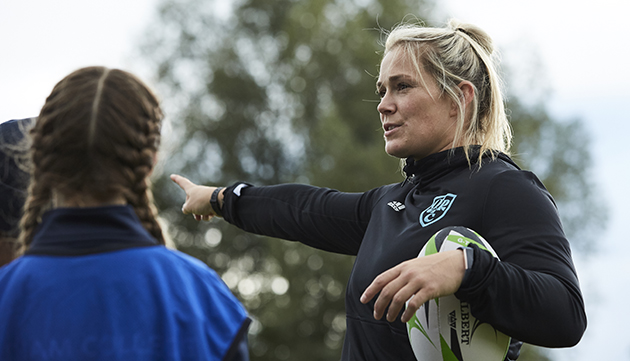The World Cup winner is a driving force in the women’s game
Rachael Burford’s vision for women’s rugby
The lack of visibility in women’s rugby hit home for Rachael Burford during training sessions for her eponymous academy. Mention the likes of Maggie Alphonsi and Emily Scarratt when demonstrating skills and she was met by blank faces and the question: Who?
“It broke me,” she says. “These girls are playing the game, they’re the future, but they don’t know the stars of the women’s game. It was a bit of a wake-up call.”
That’s where her new project comes in. The Girls Rugby Club (GRC) aims to inspire female players around the world by providing an online platform to share knowledge and resources as well as face-to-face sessions run by women’s internationals.
Former England fly-half Katy Daley-Mclean could hold a workshop in the North of England, Australia Sevens star Sharni Williams may do the same Down Under and the past year has shown that sessions can also be held over Zoom too.
?Lockdown Squad Early Bird?@leanneriley189 ?@jessbreach ?♀️ ? @SchoolofKicking ? ?@SchoolOfCali ?♂️?♀️@RachaelBurf12 ?♀️?
£10 per session or 5 for £30??
Starts Sunday 1030
Sign up ? https://t.co/uc9feFxnJS
Let’s do this ?#LockDownSquad #KeepActive pic.twitter.com/ZJOmM26724
— Girls Rugby Club (@GirlsRugbyClub) January 16, 2021
As well as practical skills advice, the hope is that GRC can provide more female-specific information on strength and conditioning, nutrition and sport science, as well as redress negative stereotypes around women’s rugby.
“There are so many issues all around the world in the women’s game,” says Burford, who was part of England’s 2014 World Cup-winning squad. “I was the only girl in my school to play rugby and it’s still not normal today.
“This is about sharing knowledge with, say, 14- or 15-year-olds and it could do so much. You never know where that will take them, in their school life, their career life; it’s not just the rugby side. I hope we create incredible moments to shape players and better people.
“The aim is to provide a pathway for young girls in the game and to get rid of stereotypes that girls can’t play, to help normalise it. It’s about growing the game and supporting the next generation.
“We’ll still have face-to-face camps but we can make this much bigger than me running up to Sheffield or down to Yeovil. Top women’s athletes are so willing to give back to the game.
“It’s also about understanding how to get the best out of female athletes. A lot of training is stuff that men do so it’s taking the time to research it and looking into the detail of it. Girls are different to boys, women different to men.”
Amazing to see men championing the women’s game ??? pic.twitter.com/J4jNYZ4PMu
— Rachael Burford (@RachaelBurf12) December 12, 2020
On a broader level, if Burford could do three things for the betterment of women’s rugby, what would they be?
Number one is to have rugby on the school curriculum. Number two is a better broadcast offering; for elite rugby, be it club or international level, to be seen. The fact England’s two-Test series against France last November was televised on BBC Two was significant. And third? More female representatives at the top levels of the game.
“It’s having more women involved in leadership, within governance and administration,” says Burford. “I’d love to see more (female) head coaches of international teams, more women in the game as a whole.
“That’s critical. The game is moving on and we need women’s rugby, it’s the fastest-growing area, so why not have women involved in decision-making areas. We need to bring in diverse thinking.
“People finish playing and want to continue to contribute, to have an impact and make change, but how do we support players getting onto boards? We want players to be part of the RFU or World Rugby, they’re valuable because they understand it, have lived it, have been in the deep end of it, but so many people slip away because they don’t think there’s anything else.”

Making strides: Rachael Burford in Allianz Premier 15s action for Harlequins (Getty Images)
Burford has seen progress on the administration front. She is on World Rugby’s high-performance rugby committee and law review group as well as the International Rugby Players Council. World Rugby has increased the number of female representatives on its Council as well as launched a review to ensure there is diversity across the governing body.
“There are so many women out there, with a law background, a business background, a coaching background, who could contribute to committees… It’s about filling them with the right voices. We don’t just want one person in the room who hasn’t been involved in the game for a long time.
“The relationship between International Rugby Players and World Rugby is the strongest I’ve ever seen it. Players are getting the opportunity to have dialogue and ask questions. There’s always stuff to get better at but it’s definitely better than it was.”
Whether discussing the future of the game in boardrooms or producing future players through the Girls Rugby Club, Burford is ensuring women’s rugby is getting the respect it deserves. And you can only respect her for the influence she is having.
This article originally appeared in the January 2021 edition of Rugby World magazine.
Follow Rugby World on Facebook, Instagram and Twitter.





